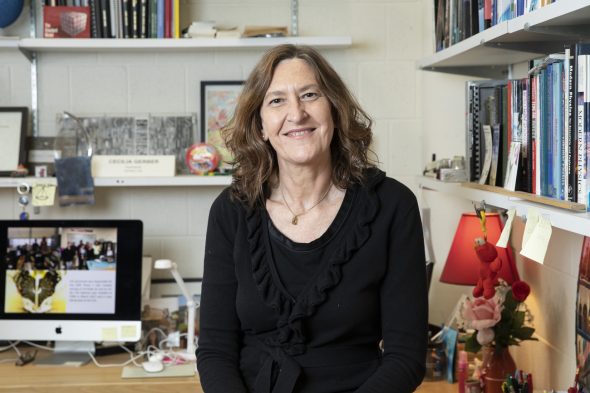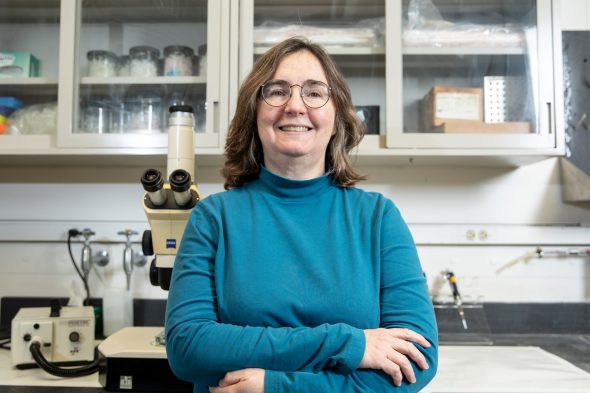UIC researchers earn distinction as AAAS fellows
A physicist and a biophysicist from the University of Illinois Chicago have been elected to the newest class of American Association for the Advancement of Science fellows, one of the top honors within the scientific community.
Cecilia Gerber, UIC distinguished professor of physics, and Constance Jeffery, UIC associate professor of biological sciences and UI Cancer Center member, will join the 2021 class of AAAS Fellows, which includes 564 scientists, engineers and innovators spanning 24 scientific disciplines who are being recognized for their scientifically and socially distinguished achievements.
Gerber was honored in the physics discipline for the development of instrumentation to identify long-lived particles, leadership in the discovery of single top quark production and production of top quark pairs, as well as for broadening participation of underrepresented students in science.
Her research is centered on the experimental study of hadron collisions at the highest energies available. Her work involves the development of semiconductor detectors that precisely track the passage of charged particles and the elucidation of the characteristics of the production processes of top quarks and searches for new physics that decay preferentially to top quarks.
Gerber, who has published more than 1,000 papers in leading scientific journals, is a member of the D-Zero collaboration at Fermilab and the Compact Muon Solenoid collaboration at CERN, the European Organization for Nuclear Research.
At UIC she has advised numerous graduate and undergraduate students and serves as director of undergraduate studies in the physics department. In 2019, she joined the leadership team for a UIC project funded by the Howard Hughes Medical Institute’s Inclusive Excellence Initiative that aims to improve the inclusion of students from diverse backgrounds in science education. Prior to arriving at the university in 2000, she was a research associate at Fermilab, where she served as coordinator of the LHC Physics Center from 2017-2020.
She is an elected fellow of the American Physical Society, University of Illinois Scholar, fellow of the UIC Honors College, and 2011 UIC Researcher of the Year.
Jeffery was honored in the medical sciences discipline for pioneering contributions to the understanding of multifunctional proteins and outstanding contributions to the training and mentoring of junior scientists.
Her research uses methods from biochemistry, biophysics (X-ray crystallography), and bioinformatics to understand how protein sequences and structures relate to their functions. She coined the term moonlighting proteins in a Trends in Biochemistry article that has been cited over 1,200 times.
A major focus of her lab is elucidating the structures and functions of these multifunctional proteins as well as their roles in metabolism, signaling pathways, interactions with extracellular matrix, and invasion and metastasis. Her current work also includes the effects of disease-associated mutations on protein structure and function.
In addition to teaching and mentoring undergraduate and graduate students at UIC, Jeffery is active in organizations supporting women and other people from groups who are underrepresented in STEM careers. She serves on the Biophysical Society’s Committee for Professional Opportunities for Women and volunteers for the 1000 Girls, 1000 Futures, and STEM Scholars programs through the New York Academy of Sciences. She has previously been recognized for her research and mentoring by Women in Bio and Women in the Enterprise of Science and Technology.
During the COVID-19 pandemic, Jeffery received a National Science Foundation grant to direct an undergraduate research experience in macromolecular structure and function. The online program brought together distinguished mentor scientists from multiple universities and provided research opportunities to student scholars from across the country during a time when other research opportunities for students were limited.
The new fellows will be celebrated later this year. The new class will also be featured in the AAAS News & Notes section of Science in January 2022.
The American Association for the Advancement of Science, the world’s largest general scientific society and publisher of the Science family of journals, was founded in 1848 and includes more than 250 affiliated societies and academies of science, serving 10 million individuals.


